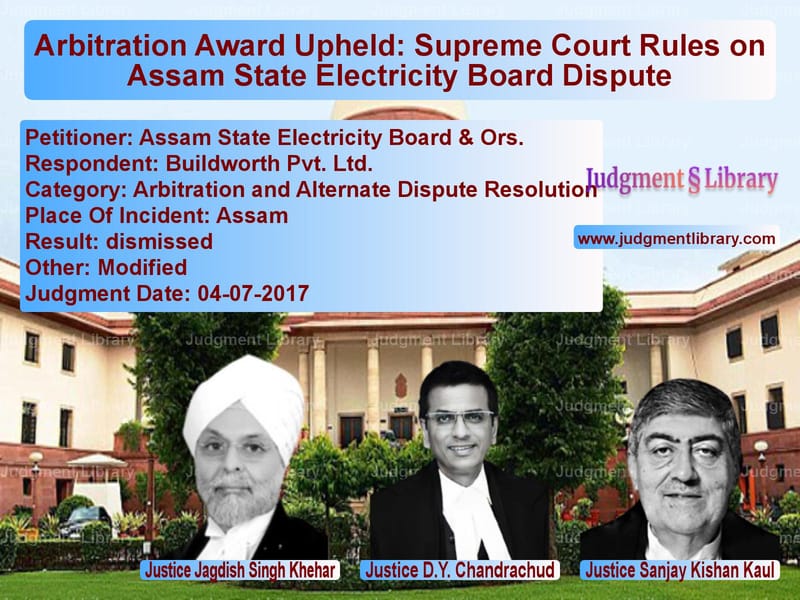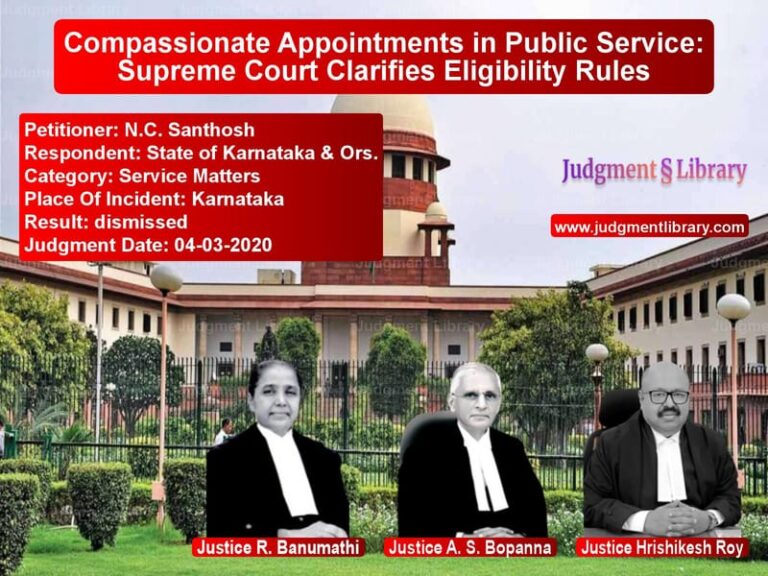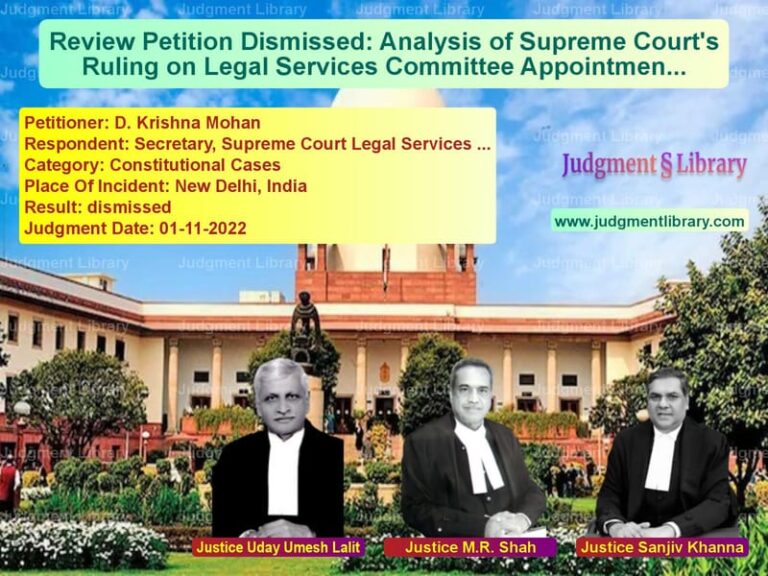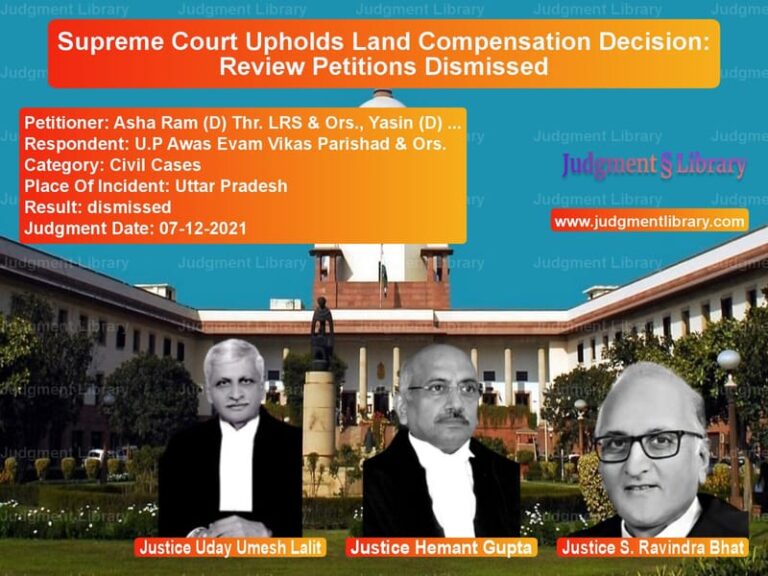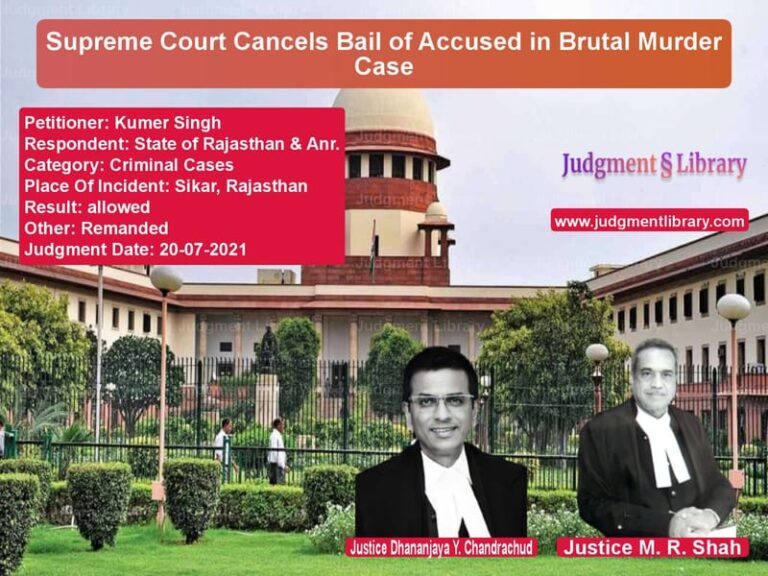Arbitration Award Upheld: Supreme Court Rules on Assam State Electricity Board Dispute
The Supreme Court’s judgment in Assam State Electricity Board & Ors. vs. Buildworth Pvt. Ltd., delivered on July 4, 2017, dealt with the enforcement of an arbitral award under the Arbitration Act, 1940. The ruling affirmed the importance of honoring contractual obligations and set a precedent for resolving disputes involving infrastructure contracts through arbitration.
The case revolved around a contract between Assam State Electricity Board (ASEB) and Buildworth Pvt. Ltd. for the installation of a water piping system at the Bongaigaon Thermal Power Station. Due to delays and cost escalations, the dispute was referred to arbitration, resulting in an award of Rs. 30,73,916 in favor of Buildworth Pvt. Ltd., along with 18% interest. ASEB challenged the award, but the Supreme Court upheld it, modifying only the interest rate.
Background of the Case
In 1982, ASEB awarded a contract to Buildworth Pvt. Ltd. for the installation of a circulating water piping system. The contract was valued at Rs. 86.82 lakhs and was supposed to be completed within 12 months. However, due to unforeseen delays, the project extended beyond the stipulated time, and additional costs were incurred.
Key events in the dispute:
- September 6, 1982: Contract signed between ASEB and Buildworth Pvt. Ltd.
- June 25, 1983: Original deadline for project completion.
- January 31, 1986: Final completion of the project.
- March 7, 1986: Buildworth Pvt. Ltd. submitted claims for additional costs.
- December 31, 1998: Sole arbitrator awarded Rs. 30,73,916 plus 18% interest to Buildworth Pvt. Ltd.
- December 22, 2000: Civil Judge, Kamrup, upheld the award.
- November 21, 2006: Gauhati High Court modified the interest component but upheld the principal award.
- July 4, 2017: Supreme Court dismissed ASEB’s appeal, modifying the interest rate to 12%.
Arguments by the Petitioners (Assam State Electricity Board)
ASEB, the appellant, contested the arbitral award on several grounds:
- The arbitrator had erred in awarding price escalation beyond the contractual ceiling of Rs. 9,16,825.
- The contract explicitly limited escalation costs, and the arbitrator exceeded his jurisdiction.
- The contractor was partly responsible for the delay, which should negate claims for additional costs.
- Interest awarded at 18% was excessive and should be reconsidered.
Arguments by the Respondent (Buildworth Pvt. Ltd.)
Buildworth Pvt. Ltd. countered ASEB’s claims by stating:
- The escalation clause applied only to the original project timeline, not the extended period.
- ASEB had implicitly allowed the contract to continue beyond the initial deadline.
- Idling charges for labor and machinery were justified due to the extended work period.
- The arbitrator had full jurisdiction to determine price variations in light of prolonged project delays.
Supreme Court’s Observations
The Supreme Court, comprising Chief Justice Jagdish Singh Khehar, Justice D.Y. Chandrachud, and Justice Sanjay Kishan Kaul, made the following key observations:
“The arbitrator has taken the view that the provision for price escalation would not bind the claimant beyond the scheduled date of completion.”
“Matters relating to the construction of a contract lie within the province of the arbitral tribunal. Moreover, in the present case, the view which has been adopted by the arbitrator is based on evidentiary material which was relevant to the decision.”
“The arbitrator has neither misconducted himself in the proceedings nor is the award otherwise invalid.”
Supreme Court’s Judgment
The Supreme Court ruled:
- The arbitrator’s decision to grant price escalation was valid as ASEB had informally extended the contract period.
- The claim for idling charges was justified as additional work required separate mobilization of labor and machinery.
- The interest award was reduced from 18% to 12% per annum.
- ASEB’s appeal was dismissed, and the award in favor of Buildworth Pvt. Ltd. was upheld.
Key Takeaways
- Arbitrator’s Discretion: The ruling reaffirmed that arbitrators have broad discretion in contract interpretation.
- Price Escalation Claims: Contracts with escalation limits do not automatically apply to extended project periods.
- Enforceability of Awards: Courts should not interfere with arbitrators’ findings unless there is clear misconduct.
- Interest Modifications: Excessive interest rates can be adjusted by courts while upholding principal awards.
Impact of the Judgment
This ruling strengthens the enforceability of arbitration awards in India and provides clarity on contractual escalation clauses. It ensures:
- Arbitration remains a viable dispute resolution mechanism.
- Government entities are held accountable for project delays.
- Parties adhere to their contractual commitments.
- Arbitration awards are not arbitrarily overturned by courts.
Conclusion
The Supreme Court’s decision in Assam State Electricity Board vs. Buildworth Pvt. Ltd. upholds the sanctity of arbitration and ensures that contracts are interpreted fairly. By dismissing ASEB’s appeal, the Court reinforced the principle that contractual obligations must be honored, and delays must be compensated. This case serves as a guiding precedent for future infrastructure contract disputes in India.
Don’t miss out on the full details! Download the complete judgment in PDF format below and gain valuable insights instantly!
Download Judgment: Assam State Electric vs Buildworth Pvt. Ltd. Supreme Court of India Judgment Dated 04-07-2017.pdf
Direct Downlaod Judgment: Direct downlaod this Judgment
See all petitions in Arbitration Awards
See all petitions in Dispute Resolution Mechanisms
See all petitions in Enforcement of Awards
See all petitions in Judgment by Jagdish Singh Khehar
See all petitions in Judgment by Dhananjaya Y Chandrachud
See all petitions in Judgment by Sanjay Kishan Kaul
See all petitions in dismissed
See all petitions in Modified
See all petitions in supreme court of India judgments July 2017
See all petitions in 2017 judgments
See all posts in Arbitration and Alternate Dispute Resolution Category
See all allowed petitions in Arbitration and Alternate Dispute Resolution Category
See all Dismissed petitions in Arbitration and Alternate Dispute Resolution Category
See all partially allowed petitions in Arbitration and Alternate Dispute Resolution Category

